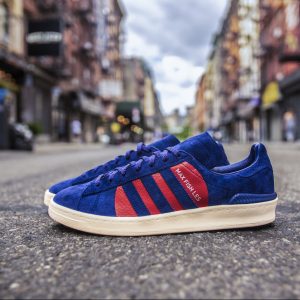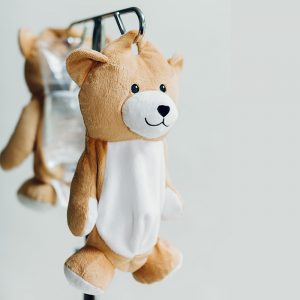Link About It: This Week’s Picks
The end of the VW beetle, celebrating iconic NYC dive bar Max Fish, robots, rockets and more

Eight Frank Lloyd Wright Works Added to UNESCO’s World Heritage List
 In a serial nomination, inscribed as “The 20th-Century Architecture of Frank Lloyd Wright,” eight major works of the beloved architect join UNESCO’s World Heritage List. This is the first recognition of modern American architecture by the cultural organization. To coordinate the conservation efforts, the Frank Lloyd Wright World Heritage Council has been formed. The designation includes homes designed for clients (including Hollyhock House, Robie House and Fallingwater) as well as public works the Unity Temple and Solomon R. Guggenheim Museum. Two of the architect’s private residences were included, as well: Wisconsin’s Taliesin and Arizona’s Taliesin West. Read more at the New York Times.
In a serial nomination, inscribed as “The 20th-Century Architecture of Frank Lloyd Wright,” eight major works of the beloved architect join UNESCO’s World Heritage List. This is the first recognition of modern American architecture by the cultural organization. To coordinate the conservation efforts, the Frank Lloyd Wright World Heritage Council has been formed. The designation includes homes designed for clients (including Hollyhock House, Robie House and Fallingwater) as well as public works the Unity Temple and Solomon R. Guggenheim Museum. Two of the architect’s private residences were included, as well: Wisconsin’s Taliesin and Arizona’s Taliesin West. Read more at the New York Times.
Sam Jacob Studio Designs London’s Cartoon Museum
 Housing some 6,000 pieces of art and an 18,000-volume library of cartoons and comics, London’s Cartoon Museum has a new, permanent home designed by Sam Jacob Studio. Be it the two main galleries or the education room (accessible by a door hidden in a bookcase), bright and bold graphic features define the interior experience. It’s a well-matched design for the works within. Read and see more at An Interior.
Housing some 6,000 pieces of art and an 18,000-volume library of cartoons and comics, London’s Cartoon Museum has a new, permanent home designed by Sam Jacob Studio. Be it the two main galleries or the education room (accessible by a door hidden in a bookcase), bright and bold graphic features define the interior experience. It’s a well-matched design for the works within. Read and see more at An Interior.
adidas Skateboarding Honors 30 Years of Iconic NYC Dive Bar Max Fish
 On the heels of a thoughtful collaboration with the estate of Keith Haring, adidas now celebrates iconic NYC dive bar Max Fish with an ultra-limited edition sneaker drop. “The Fish,” which opened on Ludlow St in 1989 and shuttered temporarily only to open nearby on Orchard St in 2014, was a well-known watering hole for downtown skateboarders. adidas Skateboarding’s collaborative sneaker, the Max Fish Campus ADV, references the bar’s blue and red awning by way of a premium navy suede upper with red screen-printed polka dots. It goes on sale at select national skateboard retailers and Max Fish on 12 July. Read more at Hypebeast.
On the heels of a thoughtful collaboration with the estate of Keith Haring, adidas now celebrates iconic NYC dive bar Max Fish with an ultra-limited edition sneaker drop. “The Fish,” which opened on Ludlow St in 1989 and shuttered temporarily only to open nearby on Orchard St in 2014, was a well-known watering hole for downtown skateboarders. adidas Skateboarding’s collaborative sneaker, the Max Fish Campus ADV, references the bar’s blue and red awning by way of a premium navy suede upper with red screen-printed polka dots. It goes on sale at select national skateboard retailers and Max Fish on 12 July. Read more at Hypebeast.
Virgin Orbit’s First Rocket Drop from a Modified Boeing 747
 Virgin Galactic sister company Virgin Orbit is one step closer to air-launching satellites. Their first-ever rocket drop test from a modified Boeing 747 carrier (named Cosmic Girl) was a notable success. The goal of the test was to enact and observe a clean, careful separation of a LauncherOne rocket payload and carrier craft. An orbital flight for the rocket is the next milestone they hope to achieve. Watch it all unfold on Space.com.
Virgin Galactic sister company Virgin Orbit is one step closer to air-launching satellites. Their first-ever rocket drop test from a modified Boeing 747 carrier (named Cosmic Girl) was a notable success. The goal of the test was to enact and observe a clean, careful separation of a LauncherOne rocket payload and carrier craft. An orbital flight for the rocket is the next milestone they hope to achieve. Watch it all unfold on Space.com.
The End of Volkswagen Beetle Production
 From an emblem of the ’60s to a global design icon, the Volkswagen Beetle surmounts the reputation of almost all other automobiles. The historic car’s identity, proportions and curves changed over time as more than 21 million units sold. This year, however, marks the end of the Beetle, as VW halts production at its Puebla, Mexico plant. Only time will tell if this is merely a pause, as with the last disruption that later resulted in the retro-inspired new Beetle of 1998. The final, limited edition Beetle will appears in both coupé and convertible models for the US market. Read more at designboom.
From an emblem of the ’60s to a global design icon, the Volkswagen Beetle surmounts the reputation of almost all other automobiles. The historic car’s identity, proportions and curves changed over time as more than 21 million units sold. This year, however, marks the end of the Beetle, as VW halts production at its Puebla, Mexico plant. Only time will tell if this is merely a pause, as with the last disruption that later resulted in the retro-inspired new Beetle of 1998. The final, limited edition Beetle will appears in both coupé and convertible models for the US market. Read more at designboom.
The Creative Class is Growing in Smaller Cities
 Using data from the US Census American Community Survey, CityLab’s Richard Florida and economist Todd Gabe tracked the growth of the creative class across the country. Popular belief assumes that talent is concentrated in bigger cities (NYC, LA, SF) but data actually supports the opposite. In fact, the aforementioned cities have experienced the slowest growth since 2005. Instead, Salt Lake City, Pittsburgh, Cincinnati, Grand Rapids and Cleveland are home to the most rapid growth for creative industries—and since these jobs are often higher paying, this is valuable insight into the wellbeing of their individual economies. Read more at CityLab.
Using data from the US Census American Community Survey, CityLab’s Richard Florida and economist Todd Gabe tracked the growth of the creative class across the country. Popular belief assumes that talent is concentrated in bigger cities (NYC, LA, SF) but data actually supports the opposite. In fact, the aforementioned cities have experienced the slowest growth since 2005. Instead, Salt Lake City, Pittsburgh, Cincinnati, Grand Rapids and Cleveland are home to the most rapid growth for creative industries—and since these jobs are often higher paying, this is valuable insight into the wellbeing of their individual economies. Read more at CityLab.
Moxi the Robot Joins Nursing Staff in Texas Hospitals
 As Fast Company reports, not only are nurses in high demand, there’s also an actual shortage which may grow over the next decade. To help alleviate roughly 30% of the tasks that nurses do (those that do not involve patient interaction) Austin’s Diligent Robotics have designed and built Moxi the robot. Moxi has now entered the workforce at a few Texas hospitals. There, the robot connects to each hospital’s electronic health record system and can be pre-programmed for several errands. Perhaps unsurprisingly, Moxi has also impacted patients directly, who have sought out various interactions. Read more about Moxi at Fast Company.
As Fast Company reports, not only are nurses in high demand, there’s also an actual shortage which may grow over the next decade. To help alleviate roughly 30% of the tasks that nurses do (those that do not involve patient interaction) Austin’s Diligent Robotics have designed and built Moxi the robot. Moxi has now entered the workforce at a few Texas hospitals. There, the robot connects to each hospital’s electronic health record system and can be pre-programmed for several errands. Perhaps unsurprisingly, Moxi has also impacted patients directly, who have sought out various interactions. Read more about Moxi at Fast Company.
Kristalic Seeks to Provide “Cloud-Based Personal Memory Banks”
 Using existing microphone-equipped devices (like AirPods and smartphones), Kristalic is an AI-powered assistant that can record conversations throughout your work day in order to then condense them into a memory bank that can be easily searched later. The startup—founded by Techstars Seattle alum Jos van der Westhuizen—aims to extract “only the most important information from a meeting” and can also send weekly updates. The company is still building the assistant, but is in the midst of multiple rounds of investor funding. Read more at GeekWire.
Using existing microphone-equipped devices (like AirPods and smartphones), Kristalic is an AI-powered assistant that can record conversations throughout your work day in order to then condense them into a memory bank that can be easily searched later. The startup—founded by Techstars Seattle alum Jos van der Westhuizen—aims to extract “only the most important information from a meeting” and can also send weekly updates. The company is still building the assistant, but is in the midst of multiple rounds of investor funding. Read more at GeekWire.
Missing Lewis Chessmen Piece Sells For £735,000 at Auction
 Made from Walrus ivory in the 12th or 13th century, this chess piece went missing from a medieval-era set and then bounced between owners before being sold at auction this past week. Acquired for just £5 in 1964, the piece was passed down through family generations, until it was taken to Sotheby’s to be appraised. While “a little bit bashed up,” the ancient item fetched £735,000 at auction—and while 93 other pieces were found on the Isle of Lewis in the Outer Hebrides in 1831, there are still five that aren’t accounted for. Read more at Sky.
Made from Walrus ivory in the 12th or 13th century, this chess piece went missing from a medieval-era set and then bounced between owners before being sold at auction this past week. Acquired for just £5 in 1964, the piece was passed down through family generations, until it was taken to Sotheby’s to be appraised. While “a little bit bashed up,” the ancient item fetched £735,000 at auction—and while 93 other pieces were found on the Isle of Lewis in the Outer Hebrides in 1831, there are still five that aren’t accounted for. Read more at Sky.
Medi Teddy Reduces Anxiety Around IVs
 Meant to alleviate the anxiety that occurs (especially for children) when an IV is dangling by your bedside, Medi Teddy keeps all the tubes hidden away inside a plush teddy bear. On the backside, doctors and nurses can keep tabs on the device by peering through a mesh net. Intended to be owned by individuals rather than hospitals, the product was invented by pediatric patient Ella Casano, who was diagnosed with a blood disorder when she was seven. Orders can be placed on their website.
Meant to alleviate the anxiety that occurs (especially for children) when an IV is dangling by your bedside, Medi Teddy keeps all the tubes hidden away inside a plush teddy bear. On the backside, doctors and nurses can keep tabs on the device by peering through a mesh net. Intended to be owned by individuals rather than hospitals, the product was invented by pediatric patient Ella Casano, who was diagnosed with a blood disorder when she was seven. Orders can be placed on their website.
Link About It is our filtered look at the web, shared daily in Link and on social media, and rounded up every Saturday morning.












